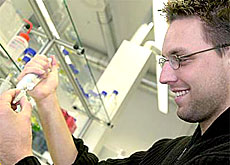Biotechnology undergoes revival

The world's biggest biotechnology fair, Bio 2003, has proved that the mood in the biotechnology sector is once again upbeat following a period in the doldrums.
The revival currently underway in the industry is expected to strengthen relations between Swiss and American companies.
Bio 2003, which opened in Washington on Sunday, has brought together more than 3,300 delegates and the largest gathering of Swiss biotech professionals ever outside Europe.
“For the first time in nearly three years, Bio is a happy conference,” writes the “Washington Post”, recognizing a mood of optimism among the participants not seen since the bursting of the financial bubble.
On Wall Street, shares of the surviving biotech firms are on the rise again. Since January the NASDAQ biotechnology index has experienced a 44 per cent gain.
Many Swiss experts attending Bio even thought that the busting of the bubble had been a positive event.
Consolidation
“After the bubble, what is happening is a consolidation, and that might be a good thing,” Felix Frueh told swissinfo. Frueh is the founder of the American consultancy Stepoutside, which advises TheraStrat, a Swiss company based in Allschwil, near Basel.
“The bubble bursting has led to a weeding-out of companies and that is positive because hot air is not tolerated anymore,” the vice-president of the Association of Swiss Biotechnology Companies (ASBC), Dominic Escher, told swissinfo.
Escher is also CEO of Esbatech, a firm based in Zurich that signed its first contract with a United States company just a month ago.
Reasonable cost
The industry shrinkage offers especially good bargain-hunting opportunities in the US for companies with a solid financial grounding.
“For a company like ours which finances projects, the moment is favourable, as biotech firms need money and we benefit from the revenues generated by our products,” explained Pietro Orsolini, managing director of Debiopharm.
Since 2002, this Swiss company specialized in the licensing of pharmaceutical products has owned the rights to a new prostate-cancer drug distributed by the US giant Pfizer.
“Before the bubble burst, the rate of royalties asked by American companies was too high but now we can get very good products at a reasonable cost,” said Orsolini.
However, the other side of the coin is that investors are now more demanding, raising commercial pressures on biotech.
“Among the surviving companies, there is a tendency to put the emphasis on programmes that can be developed quickly, and that is bad for the long term because it could kill innovation,” noted Escher.
US-Swiss relations
The contraction of the industry has not affected ties between Switzerland and the US.
“Relations between the Swiss biotech sector and its American counterpart are very close and there is a recognition of excellence on both sides,” Mario Brossi, head of the Swiss Pavilion at Bio 2003, told swissinfo.
“Many Swiss don’t realize that major US players such as Johnson&Johnson and Baxter each have five or six separate laboratories and production centres in Switzerland,” he added.
As the Swiss participants in Bio 2003 seek to develop their relations with the US market and investors, they face two challenges. One is a practical challenge, while the other is psychological.
Question of mentality
The practical challenge has to do with the legal framework surrounding biotechnology which, in the US differs greatly from that in Switzerland and the rest of Europe.
“The main challenge in the States is in the legal issues, the issues of intellectual property and liability,”said Escher. “We need very good American lawyers.”
For Swiss firms in the US, the other challenge is “a question of mentality”, according to Frueh.
“The marketing material from Swiss companies is very detailed and scientifically oriented but it fails to give the ten-second impression that Americans want and are accustomed to,” he said.
“The American market is more aggressive but also more upfront.”
swissinfo, Marie-Christine Bonzom in Washington
Switzerland boasts about 220 biotech start-ups.
The biotech scene is concentrated around Basel, Zurich and the Lake Geneva area.
Switzerland ranks number six in Europe in terms of the number of companies active in the industry.
For market capitalisation and turnover generated in biotech, Switzerland is in the number two spot.

In compliance with the JTI standards
More: SWI swissinfo.ch certified by the Journalism Trust Initiative










You can find an overview of ongoing debates with our journalists here . Please join us!
If you want to start a conversation about a topic raised in this article or want to report factual errors, email us at english@swissinfo.ch.